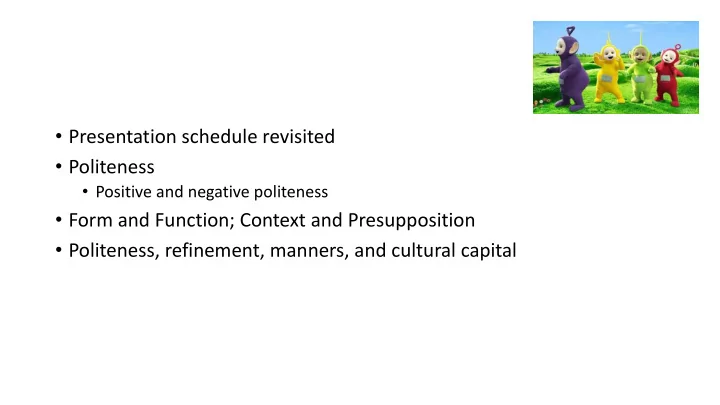

• Presentation schedule revisited • Politeness • Positive and negative politeness • Form and Function; Context and Presupposition • Politeness, refinement, manners, and cultural capital
• Presentation schedule revisited • Politeness • Positive and negative politeness • Form and Function; Context and Presupposition • Politeness, refinement, manners, and cultural capital
Politeness • Situated forms of conduct that enhance, and prevent or repair infringements on, others � face. • Positive politeness: Directly shows solidarity, appreciation for the other. (e.g. compliments, inclusiveness) • Negative politeness: Shows respect for hearer’s autonomy. (e.g. apologies, indirectness) Brown, Penelope & Stephen Levinson. 1987. Politeness: Some universals in language use.
What’s polite? • “I like your dress.” • Addressee is wearing a nice dress. • Addressee is wearing a dress borrowed from the speaker. • Addressee is wearing jeans. • Addressee has just given a talk. • Addressee has a new hairdo.
Some strategies of politeness • Hedging - � I tend to prefer coffee. � • Euphemism � shoot � • Mitigation - � This could use a little more work. � • Honorification - � Are you ready to order, sir? � • Indirectness - � Are you ready to order? �
Indirectness: Could you pass the sugar? • Locutionary force - the referential value • Request for information about the addressee’s ability to pass the sugar. • Illocutionary force – the speaker � s implication • Request that the addressee pass the sugar. • Perlocutionary force – the effect on the addressee • Addressee feels obligated to pass the sugar, passes the sugar.
No utterance has a single meaning or interactive function. "That’s a lot of weight to put on in a year isn’t it?” Doctor to patient vs. patient to doctor ”Nice dress!” Spoken to someone (e.g. at a party) wearing a dress vs. jeans. “That was a smart thing to do.” “I’m sorry.”
Context is everything
Presuppositions I believe We believe Anita Hill her
The Cooperative Principle: participants expect that each will make a “conversational contribution such as is required, at the stage at which it occurs, by the accepted purpose or direction of the talk exchange.” • Quantity: • Be as informative as possible, providing as much information as needed, and no more. • Quality: • be truthful, don’t say things for which you lack evidence. • Relation: • Be relevant to the discussion. • Manner: • Be clear Grice, H. P. 1975. "Logic and conversation." In Cole, Peter, and J. L. Morgan (eds). Syntax and semantics: Speech acts. Volume 3. New York: Academic Press. 41–58.
Implicatures A: Do you want to go to the Movies tonight? B: I have an exam tomorrow. A: Do you want to go to the Movies tonight? B: I have to wash my hair. A: When is John coming? B: He’s talking to Sam
Analyzing Just • Leave out adjectival uses (i.e. related to justice) • Find as many kinds of uses of just as you can. • Which of these are self-demeaning, and how? • What other functions does just have? • What issues would you take into consideration if you were to undertake a study of the gendered use of (some occurrences of) just ?
Politeness and manners – a slippery slope • saying “thank you” • Bringing flowers or candy when invited for dinner • Dressing appropriately • Not picking your nose, farting or burping • Chewing with your mouth closed • Not chewing gum • Sitting up straight • Using standard language
Manners as Cultural Capital
Language in a system of value: Forms of Capital • Economic : command of cash, material assets • Social : “…durable network of more or less institutionalized relationships of mutual acquaintaince and recognition” • Cultural : legitimated knowledge, attitudes (education, skill, manners…) • Symbolic : reputation (honor, prestige, recognition) Bourdieu, Pierre. 1986. Forms of capital. Handbook of theory and research for the sociology of education, ed. by J.G. Richardson, 241-58. New York: Greenwood Press.
• Life-styles are … the systematic products of habitus, which, perceived in their mutual relations through the schemes of the habitus, become sign systems that are socially qualified (as ‘distinguished’, ‘vulgar’ etc.). The dialectic of conditions and habitus is the basis of an alchemy which transforms the distribution of capital, the balance-sheet of a power relation, into a system of perceived differences, distinctive properties, that is, a distribution of symbolic capital, legitimate capital, whose objective truth is misrecognized . Bourdieu, Pierre. 1984. Distinction: A social critique of the judgement of taste. Cambridge: Harvard University Press. P. 172.
the elite • Conspicuous consumption and leisure as the pursuit of waste • Active distance from necessity • Conservatism and essentialism (‘taste’ as a natural gift) Veblen, Thorston. 1994. Theory of the leisure class. New York: Penguin (Originally published 1899). Bourdieu, Pierre. 1984. Distinction: A social critique of the judgement of taste. Cambridge: Harvard University Press.
Think about as you read … • You might want to read the McConnell-Ginet article first. • What kinds of presuppositions are conduced in the newspaper coverage of Tongzhi? • How does presupposition work in the use of the dessert metaphor?
Recommend
More recommend